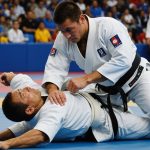Overview of Muscle Recovery Nutrition
In the realm of combat sports, effective muscle recovery is crucial for maintaining peak performance and preventing injury. Nutrition plays an indispensable role in this process. Without appropriate nutrition strategies tailored to the specific demands of combat sports, athletes may experience prolonged recovery times, reduced performance, and increased vulnerability to injuries.
Athletes in the UK combat sports scene often encounter dietary deficiencies, primarily due to the rigorous demands of their training regimes. Common deficiencies include inadequate protein intake, insufficient healthy fats, and imbalanced carbohydrate consumption. Addressing these gaps is vital as they can significantly impair muscle repair and growth.
Also to read : Maximize your kickboxing strength: the ultimate resistance band guide for uk fighters
Macronutrients—proteins, fats, and carbohydrates—each have distinct roles in muscle recovery:
- Proteins are essential for repairing muscle fibres damaged during intense training sessions. They provide the building blocks necessary for muscle repair and growth.
- Carbohydrates supply energy for training and recovery, replenishing glycogen stores and contributing to optimal performance.
- Healthy fats play a supportive role by reducing inflammation and providing energy.
By understanding and implementing specific nutrition strategies, combat sports athletes can enhance their muscle recovery and overall performance. This not only improves their recovery time but ensures they can train harder and more effectively over the long term.
Topic to read : Enhancing athletic recovery: the impact of massage therapy on combat sports athletes in the uk
Key Nutrients for Effective Muscle Recovery
Muscle recovery is crucial for athletes, especially those in combat sports. This section will explore the role of essential nutrients, including protein, carbohydrates, and fats, in facilitating effective recovery.
The Role of Protein
Protein is a cornerstone of muscle recovery. It aids in the repair and growth of muscle tissues. The protein requirements vary significantly among different combat sports. For instance, a wrestler may require up to 1.8 grams of protein per kilogram of body weight to support intense training and muscle repair. Consuming adequate protein after workouts can enhance recovery.
Carbohydrates for Energy Restoration
Carbohydrates replenish glycogen stores in muscles, crucial for restoring energy levels. Timing your carbohydrate intake can amplify muscle recovery. It is beneficial to consume carbohydrates within 30 minutes post-training when muscles are most receptive to glycogen uptake. Opt for complex carbohydrates like whole grains and fruits to maintain energy balance.
Healthy Fats in Recovery
Incorporating healthy fats into the diet supports overall recovery by reducing inflammation. Sources of healthy fats include avocados, nuts, and olive oil. These foods provide the essential fatty acids needed for maintaining cell membrane integrity and hormone production. Balancing fat intake ensures the body remains robust and ready for the next training session.
Nutrient Timing and Meal Planning
Successfully navigating the realm of nutrient timing can enhance an athlete’s performance and recovery. Focus on timing your nutrient intake, especially post-exercise, to maximize recovery. Ideally, consume a combination of protein and carbohydrates within 30 to 60 minutes after training. This intake timing can replenish muscle glycogen effectively and promote muscle repair.
Structuring your recovery meals is crucial. Aim for a balanced meal comprising lean protein, complex carbohydrates, and some healthy fats. An example could be a chicken breast with quinoa and a portion of avocado. Snacks can also aid in recovery; consider Greek yogurt with a handful of berries or a smoothie made from bananas and protein powder.
Busy schedules often challenge effective meal planning. Consider preparing meals in advance or opting for portable options that fit your routine. Use weekends to batch-cook and portion your meals for the week. Additionally, choosing quick yet nutritious options, like ready-to-eat salads or pre-sliced veggies, can support your dietary needs on the go.
By focusing on practical meal planning and understanding the importance of nutrient timing, athletes can optimize their recovery and fuel their performance more efficiently.
Hydration Strategies for Recovery
Staying hydrated is pivotal for effective muscle recovery, especially for athletes engaging in combat sports. Proper hydration aids in maintaining optimal performance, reducing fatigue, and preventing injuries. It supports the body’s ability to repair muscles after intense workouts or competitions, making it a crucial component of any training routine.
It’s vital to adopt best practices for maintaining fluid levels. Begin by drinking water consistently throughout the day, not just during workouts. Monitoring hydration levels can be done by checking the colour of your urine—pale yellow usually suggests adequate hydration. Incorporating fluids into your recovery plan shortly after physical activity can replace lost fluids swiftly.
For combat sports athletes, maintaining an electrolyte balance is equally important. During intense exercise, the body loses electrolytes like sodium and potassium through sweat. These electrolytes are crucial for muscle contractions and nerve function, so replenishing them is essential. Consuming sports drinks or eating foods high in electrolytes, such as bananas or yogurt, can support recovery.
Ensuring a balance between water intake and electrolyte consumption can significantly impact recovery, leading to improved performance and reduced injury risk. Implement these strategies for both everyday training and recovery days to optimize your athletic potential.
Common Recovery Challenges in Combat Sports
Combat sports athletes often encounter diverse recovery challenges, largely due to the intense physical demands of their sport. These challenges can range from muscle fatigue to tissue damage, which, if not properly addressed, can severely impact performance. Ensuring effective recovery isn’t just about rest; it’s a multifaceted process that involves strategic dietary solutions and informed nutritional choices.
Combat sports athletes can leverage dietary solutions that are nutrient-dense and aimed at supporting muscle repair and reducing inflammation. Protein intake, crucial for muscle recovery, combined with anti-inflammatory foods like fatty fish and leafy greens, can help mitigate muscle soreness and accelerate healing. Carbohydrates also play a vital role, as they replenish glycogen stores depleted during training.
Experts in sports nutrition emphasise the importance of a well-balanced diet tailored to the individual’s training needs. This includes strategic meal-timing to ensure optimal energy levels during workouts. Hydration further supports recovery by facilitating nutrient transport and flushing out metabolic waste products.
In conclusion, overcoming recovery challenges in combat sports demands a targeted approach. By adopting appropriate dietary solutions, athletes can effectively enhance their recovery and overall performance, ultimately facilitating their success in this demanding field.
UK-Based Dietary Resources and Guidelines
Gaining access to reliable UK nutrition guidelines and resources is crucial for athletes in combat sports striving for optimal performance. Here, we explore various support systems available to these athletes.
Local Nutrition Support Services
Combat sports athletes in the UK can access a network of local nutrition support services tailored to their specific needs. These services often include consultations with registered dietitians and nutritionists who specialise in combat sports. Such personalised dietary advice ensures that athletes receive nutrient-specific plans that enhance their athletic performance while maintaining overall health and well-being.
Educational Materials for Athletes
Books, workshops, and online platforms offer educational materials geared towards athletes in combat sports. These materials cover topics such as meal planning, macronutrient balance, and hydration. Access to such information enables athletes to make informed dietary choices that support training and competition needs.
Relevant Research and Publications
The importance of up-to-date research cannot be overstated when it comes to nutrition and performance in combat sports. Many publications in the UK focus on the intersection of diet and athletic performance. These offer insights into how tailored nutrition can benefit combat sports athletes, highlighting the latest scientific findings and best practices. Engaging with current research empowers athletes to leverage dietary strategies effectively.











